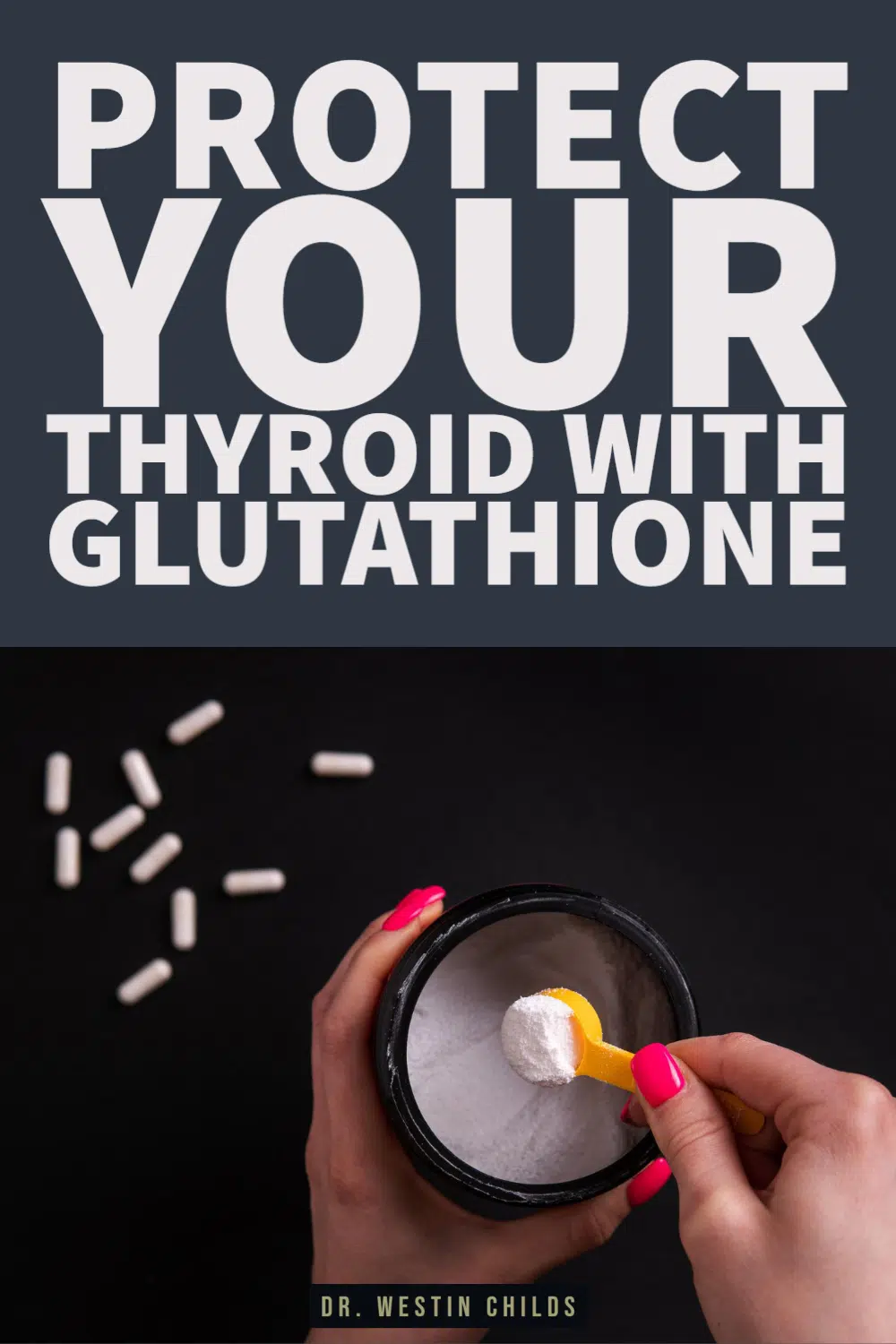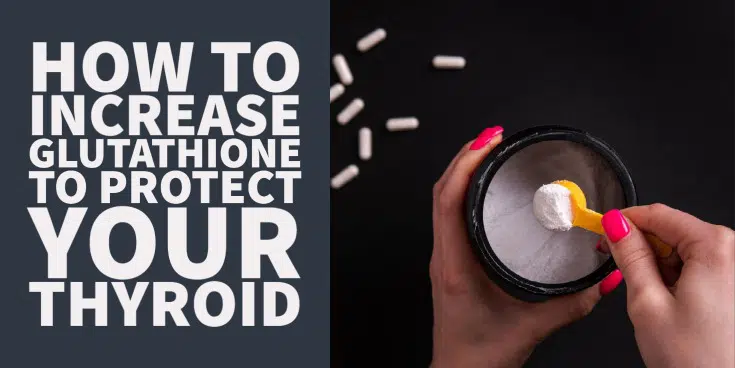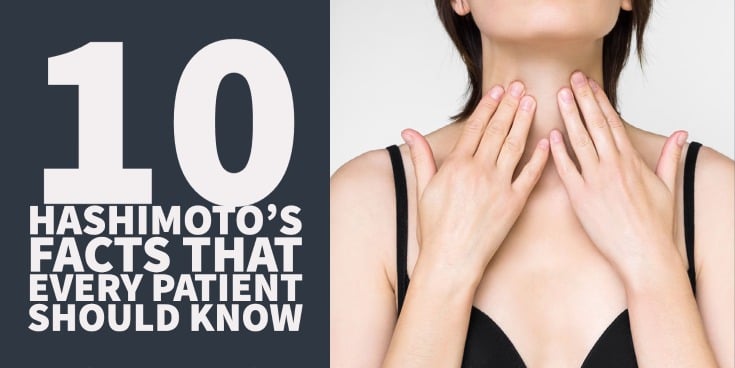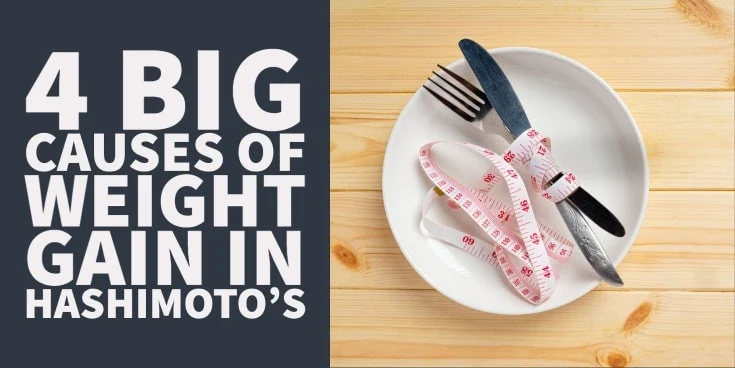When it comes to your thyroid, few substances are more important than glutathione.
You can make the argument that nutrients like iodine, tyrosine, and iron are important for the thyroid gland, but they do something completely different from glutathione.
Glutathione is the master antioxidant that your thyroid gland uses to protect itself from free radical damage.
This may not sound like a big deal but it is.
Your thyroid gland is constantly producing free radicals because they are a byproduct of thyroid hormone production!
If you are not producing enough glutathione then you won’t be able to sufficiently neutralize the free radicals that are being produced by your thyroid gland.
If you can’t do that, then eventually your thyroid gland will start to damage itself which may result in immune cell infiltration and eventually permanent thyroid gland destruction.
For this reason, ensuring that your glutathione levels are optimal is very important if you have Hashimoto’s thyroiditis.
Hashimoto’s, of course, is an immune-mediated autoimmune disease of the thyroid gland which already results in damage and inflammation.
Thus, a low glutathione status will always make the problem that much worse.
The good news is that you don’t have to just sit by and let this happen.
There are many things that you can do to help your body and liver produce more glutathione.
And this glutathione can eventually make its way to your thyroid to help protect it.
Today you will learn:
- 11 natural ways to increase your glutathione status
- How supplements can help you produce more glutathione (and which ones work best)
- Which foods can be consumed to help you produce more glutathione
- Why whey protein may be a huge source of glutathione (but also why you may want to avoid it)
- How optimizing your thyroid helps your body produce more ATP
- And much more…
DOWNLOAD FREE RESOURCES
Foods to Avoid if you Have Thyroid Problems:
I’ve found that these 10 foods cause the most problems for thyroid patients. Learn which foods you should avoid if you have thyroid disease of any type.
The Complete List of Thyroid Lab tests:
The list includes optimal ranges, normal ranges, and the complete list of tests you need to diagnose and manage thyroid disease correctly!
11 Ways to Increase Glutathione Naturally
By the way, this information applies to just about everyone!
No matter what type of thyroid disease or thyroid problem you have (even if you don’t have a thyroid problem) optimizing your glutathione status is ALWAYS a good idea.
Healthy glutathione levels slow down the aging process, help your cells function more optimally, reduce inflammation in your body, and so much more.
With this in mind, let’s talk about some of the ways that you can naturally increase glutathione production in your body.
#1. Take a Glycine Supplement
One of the easiest ways to help your body to produce more glutathione is by providing it with the building blocks that it needs for that production process.
And that’s exactly what glycine is.
Glycine is even considered a rate-limiting step (1) in the production of glutathione in the body.
What this means is that the body often waits for enough glycine in order to continue the production of glutathione.
This gives us a unique opportunity to provide the body with exactly what it needs so that it can continue to produce glutathione without interruption.
So how do you get glycine?
I think the easiest way is to take a collagen protein powder.
Collagen is known to have high concentrations of glycine as well as other amino acids that we don’t frequently get from our Standard American Diet.
You can add glycine to the list of reasons to consume collagen or gelatin including benefits such as improved hair, skin, nails, and more.
Here are a couple of things to remember when supplementing with collagen:
- Even though collagen is a protein it doesn’t take the place of protein powder. The amino acid composition of collagen is different from that of whey protein and plant-based protein powders. The amino acids in those types of powders are better for building lean muscle mass, managing appetite, and helping with weight loss. The amino acid composition of collagen is better for things like hair, skin, nails, gut health, and joint health.
- When using a collagen supplement make sure you check out the amino acid composition on the back of the nutrient label! Look for collagen supplements that are high in glycine, proline, glutamine, and arginine.
#2. Take a Glutathione Supplement
The next thing you can consider using is a pure glutathione supplement.
What do I mean?
You can actually take glutathione in the reduced form that your body needs and uses.
It can be either taken alone or in conjunction with other nutrients.
Taking glutathione in supplement form is an easy and fast way to get glutathione into your body.
There’s only one downside to glutathione supplements:
Your body uses glutathione rapidly.
Even though they do work and can be effective, you may need to take your glutathione supplement multiple times throughout the day to get a sustained benefit.
This isn’t necessarily a bad thing but you need to be aware of it.
For this reason, it’s often best to combine pure glutathione supplements with other methods which help your body to produce glutathione naturally.
This combination allows you to have an immediate form of glutathione in the form of supplements, and a more sustained production of glutathione through the use of building blocks.
I’ve included glutathione in its reduced free form in my supplement thyroid daily essentials because I’ve found it to be beneficial for patients with Hashimoto’s.
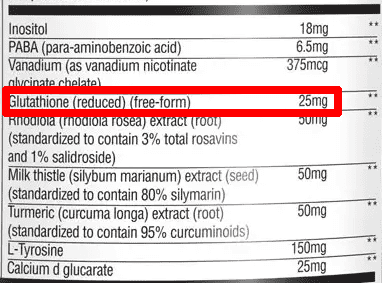
#3. Use a Coffee Enema
Another natural way to increase glutathione production is through the use of coffee enemas.
A coffee enema is exactly as it sounds. An enema filled with coffee!
Coffee enemas have been used to assist in detoxification and have been used in some alternative cancer treatments because of their impact on liver detoxification.
Here’s how they likely work:
Cooled coffee that sits in your rectum makes it back to your liver via enterohepatic circulation (2).
This coffee then stimulates the liver to produce something called glutathione s-transferase which is a powerful antioxidant with anti-inflammatory properties.
This product then gets distributed through the body to the tissues that need it.
In our case, it would be the thyroid gland.
In addition to its benefits on glutathione production, coffee enemas also help:
- With constipation – A common problem among those with Hashimoto’s, hypothyroidism, or low thyroid function! Improving the kinetics of the bowel can help prevent issues such as bacterial overgrowth syndromes and ensure you have a healthy microbiome.
- Detoxification – Thyroid patients, especially those with Hashimoto’s, are susceptible to endocrine-disrupting chemicals. These chemicals can interfere with how well your body uses and processes thyroid hormones. Treatments that assist with detoxification can help your body eliminate these chemicals.
Coffee enemas are not well accepted by the conventional medical community (3) and we don’t have as much data or information suggesting they can be beneficial compared to some of the other topics we will be discussing today.

If this is an issue for you then you may want to avoid this option altogether.
Also, if you do decide to try a coffee enema then make sure you are doing it correctly!
There are several steps that should be followed to avoid complications such as burning yourself.
#4. Take a Selenium Supplement
Another easy and beneficial way to raise glutathione is through the use of selenium supplements.
Selenium provides huge benefits to both thyroid function and immune health and is considered a staple nutrient for those with Hashimoto’s.
Your body concentrates selenium in the thyroid gland, even in deficient states (4), because of how important it is to everyday thyroid gland function.
Your thyroid gland needs selenium in order for certain enzymes to function correctly.
These enzymes, known as selenoproteins (5), help protect your thyroid gland from free radical damage.
When you produce thyroid hormones (T4 and T3) your body also produces some hydrogen peroxide free radicals.

These free radicals must be neutralized or else they will damage your thyroid gland cells.
Your body handles these free radicals by producing glutathione.
For this reason, adequate selenium levels help to protect your thyroid gland from inflammation and subsequent damage.
You can see this play out in some studies that show that taking selenium supplements can help reduce thyroid antibodies (6) in certain patients with Hashimoto’s.
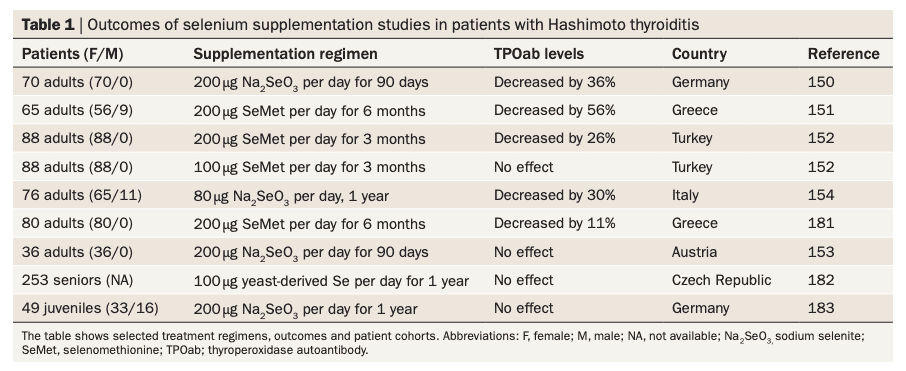
If you have Hashimoto’s, you should pay close attention to your selenium intake and use supplements if necessary to boost your levels.
A daily dose of selenium of around 50 to 150mcg per day is usually sufficient to ward off deficient states and to protect your thyroid gland from damage.
If you want to get the right amount of selenium in the correct form then check out this supplement.
#5. Eat Foods High in Sulfur
Prefer to try and heal your body through your diet? That may be a possibility.
Eating foods high in sulfur may be one way you can help your body create more glutathione
Sulfur happens to be required (7) for the synthesis of glutathione.
By targeting specific foods you can increase how much sulfur you are getting from your diet.
These foods then may provide your body with the building blocks to create more glutathione.
Foods naturally high in sulfur include (8):
- Cruciferous vegetables (9) (Broccoli, Cauliflower, Brussels sprouts, etc.)
- Peas
- Lentils
- Beef
- Organ meats
- Turkey and chicken
- Eggs
- Dairy products
- Fish
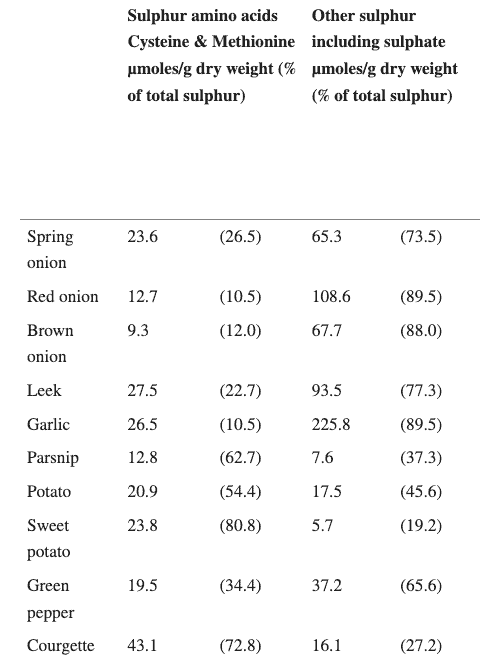
It’s worth pointing out that some of these foods may not be tolerated by those who have Hashimoto’s.
Lentils, for instance, may cause bloating and gas and may exacerbate existing intestinal problems.
Dairy products may result in digestive issues and even immune-related problems.
Cruciferous vegetables contain goitrogens which may block iodine uptake in the thyroid gland in low iodine states.
And so on.
Don’t get me wrong, I’m not saying that these things will happen or that you should avoid these foods but I am saying that you need to pay attention to how you respond to them.
Avoid foods that cause you distress or discomfort and consume those that you are more able to tolerate.
#6. Try These Other Supplements
If eating sulfur-containing foods is not possible due to religious issues, food intolerance, or any other problem, then there are other alternatives that you can try.
One such alternative would be a sulforaphane (10) supplement.
Sulforaphane, as the name implies, contains sulfur and is considered one of the main ingredients which make cruciferous vegetables so healthy.
Taking a sulforaphane supplement does not give you all of the benefits that eating something like broccoli would but it does provide you with a source of sulfur.
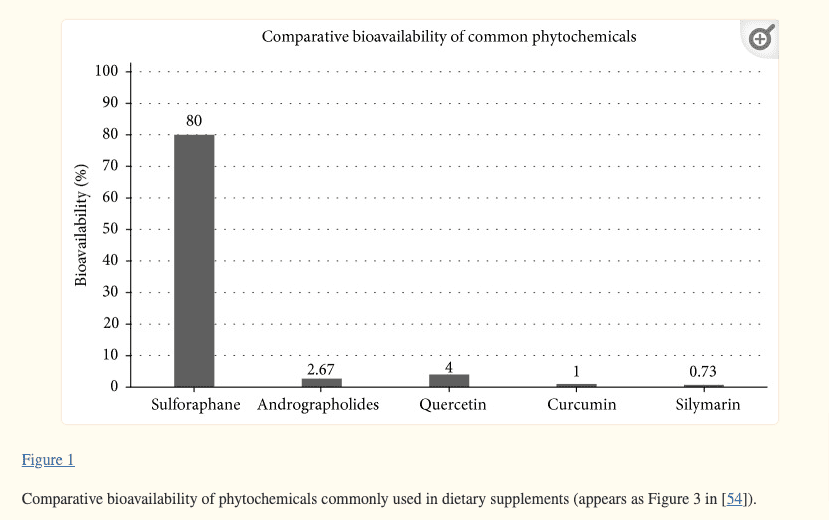
Sulforaphane, like many cruciferous vegetables, does have some goitrogenic effect but this effect can be mitigated by consuming extra iodine.
Really the only Hashimoto’s patients who experience issues with goitrogens are those who are already deficient in iodine or those who are consuming massive quantities of goitrogenic compounds (this is rare).
Another supplement worth considering is milk thistle.
Milk thistle is an ingredient that has been shown to improve liver health (11) and may also help increase glutathione (12) levels.
If you don’t want to use sulforaphane then using milk thistle may be another option for you.
Lastly, you can also try taking a comprehensive B complex vitamin.
Many of the B vitamins are involved in the recycling of glutathione (13).
Because patients with Hashimoto’s tend to be deficient in many B vitamins, taking a B complex can help replace these levels and help your body use and reuse glutathione more effectively.
This recycling of glutathione is important because your cells are constantly under damage and constantly need repair and protection.
#7. Use Whey Protein or Drink Raw Milk
There’s a big caveat to this section but before I get to that let’s talk about whey protein and raw milk.
A huge benefit to using whey protein powder (and this also applies to raw milk) is that it seems to have a profound impact on boosting glutathione (14) when consumed.
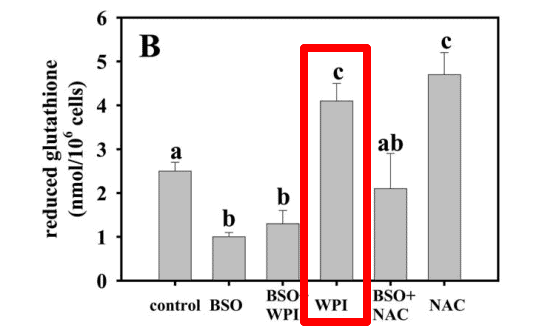
*The image above shows the effects of various compounds on glutathione levels. Abbreviation definitions: BSO (buthionine sulfoximine, a known inhibitor of glutathione synthesis), WPI (whey protein isolate), and NAC (N-acetyl cysteine).
This benefit probably stems from the amino acid content found in whey protein and the fact that these amino acids are used as building blocks for producing glutathione.
Raw milk also seems to provide this benefit because raw milk has a higher concentration of whey proteins compared to pasteurized versions.
This all sounds good but both whey protein and raw milk have a big potential downside for those with Hashimoto’s:
Most patients with Hashimoto’s do not tolerate dairy!
Not only do they not tolerate it, but dairy may also result in immune dysfunction and lead to problems like inflammation in the thyroid gland.
For this reason, using raw milk and whey protein is probably not a great option for most patients with Hashimoto’s but it can be considered if you are someone who can tolerate dairy products.
If you want a deep dive into the pros and cons of various types of protein powders for Hashimoto’s check out this blog post.
#8. Take a Magnesium Supplement
When optimizing for glutathione production you have to make sure that you have sufficient magnesium levels.
Magnesium is a nutrient required for the production of ATP.
Remember:
ATP is the energy currency of your cells and your body needs it to do pretty much everything.
And because glutathione production and recycling is an ATP-intensive process, you need to make sure that nothing impairs the production of ATP in your cells.
Magnesium deficiency is a problem for patients with Hashimoto’s for two big reasons:
- Stress depletes magnesium (15) – Do you feel like you are under a lot of stress? If you are like most people with thyroid disease then the answer is yes. The more stress that you are under the more magnesium you will need.
- Thyroid conditions alter the excretion of magnesium in the kidneys – Altered thyroid states (such as those that occur with Hashimoto’s) can make your body eliminate more magnesium than you want it to in your kidneys.
These two conditions result in the need for extra magnesium supplementation for most patients with Hashimoto’s (16).
Magnesium is a supplement that I take just about every single day and I don’t have thyroid problems.
It’s just that important for overall health but also for managing important systems such as glutathione production.
#9. Get 8 Hours of Sleep Each Night
There’s probably nothing more important for your health than getting enough sleep.
Whenever I mentioned how important sleep is for the thyroid I always hear people tell me that they try and no matter what they do they just can’t figure out how to get more sleep.
I have created an entire resource with tips and tricks all designed to help you sleep better.
For purposes of this article, just realize that not getting enough sleep will impair (17) your body’s ability to produce glutathione.
What’s the magical number?
Try to get at least 8 hours of sleep each and every night.
#10. Improve Your Thyroid Function (Naturally or with Medications)
#10 and #11 kind of go together because they are more focused on treating conditions that exist in your body that limit how much glutathione your body is capable of producing.
The first is thyroid function which is obviously huge for those with Hashimoto’s.
As you well know, Hashimoto’s ultimately results in low thyroid function (hypothyroidism) over time.
This isn’t a huge deal because it can be managed with both medical treatments as well as natural treatments.
But the key here is to make sure that regardless of what type of treatment you are using, your thyroid function is optimized.
This means getting as close to 100% of normal thyroid function as you possibly can.
The reason is simple:
Low thyroid states will reduce ATP production and, therefore, reduce glutathione production.
For this reason, if you have Hashimoto’s, you better make sure that your low thyroid symptoms are managed and controlled.
You should NOT be experiencing symptoms like hair loss, weight gain, cold intolerance, fatigue, and so on.
If you are, that’s an indication that you need to make changes to your thyroid treatment regimen.
#11. Reverse Insulin Resistance if Present
Another condition that impairs glutathione production is insulin resistance.
From a statistics standpoint, about 50% of adults (18) in the US have insulin resistance.
This number is even high in those who have Hashimoto’s because of how thyroid function impacts insulin levels (19).
In other words, if the average person has a 50% chance of developing insulin resistance then patients with thyroid disease probably have about a 70% chance of having the same condition.
And this is a problem because insulin resistance will impair glutathione production via its impact on ATP production (much like magnesium deficiency).
If present, you should address insulin resistance with therapies such as:
- Low carbohydrate diet
- Certain supplements
- Certain medications
- Prolonged and intermittent fasting
- Weight training
Final Thoughts
Optimizing your glutathione status is an easy way to help protect your thyroid gland from autoimmune damage if you have Hashimoto’s.
There are many different paths and avenues you can take to improve your glutathione status.
If you aren’t sure where to start then I would recommend focusing on some low-hanging fruit such as improving your sleep, changing your diet, and taking supplements that contain glutathione.
From there you can move into more advanced treatments as necessary.
Now I want to hear from you:
Before reading this article did you know how important glutathione was for thyroid health and Hashimoto’s?
Are you already using some of the therapies listed here?
If not, are you planning on using any?
Leave your questions or comments below to keep the conversation going!
